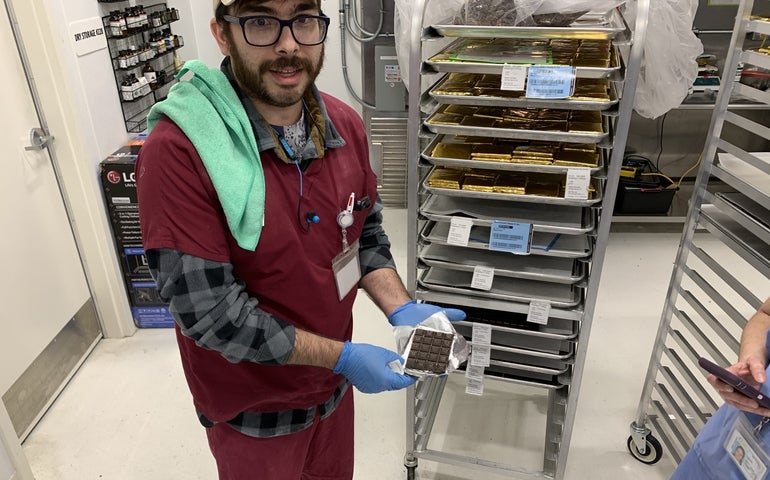Revolutionary Clinics Co-founder Ryan Ansin led a tour of the company’s marijuana cultivation facility in Fitchburg on Wednesday to tout the industry’s effort to revitalize the regional economy.
U.S. Rep. Lori Trahan (D-Lowell), Fitchburg Mayor Stephen DiNatale, and Cannabis Control Commissioner Jennifer Flanagan donned scrubs and booties to see the operation in the brick factory, which once made shoes for New Hampshire manufacturer Cole Haan.
Revolutionary Growers LLC bought the 244,000-square-foot property in 2016 for $1.5 million. The entity is managed by investor Robert Bohlen.
Trahan and DiNatale said the cannabis industry is helping to solve the problem of filling vacant factory buildings unoccupied for years.
“We see this as one way of putting these buildings back on the tax rolls,” DiNatale said. “We welcome this industry and the jobs it brings.”
Today, he said, there are only two or three empty mill buildings left in the city, which he called a sign of success.
The four-story property pays about $194,000 in annual real estate taxes, according to the city’s Assessor’s Office. Two other growers also operate in Fitchburg including the Massachusetts Patient Foundation’s which paid $116,000, and Garden Remedies which pays $95,000.
Trahan, who noted her grandmother once worked in the shoe factory, said while the U.S. House of Representatives passed bi-partisan legislation last fall to allow the cannabis industry access to banking and financial services last fall, even as the substance remains illegal under federal law, the measure remains stalled in the U.S. Senate.
“The Senate is preoccupied with other business” said Trahan, referring to the impeachment trial of President Donald Trump.
She said the question of whether pot should be legalized by Congress will be taken up at some point, but likely not anytime soon.
Ansin said the 135-year-old factory has been in his family’s business since the 1950s. He said the family has tried a number of different light manufacturing efforts before they settled on marijuana.
After being closed for a long time, Revolutionary Clinics outfitted the facility to cultivate medical marijuana in 2017. Today, the company employs 120 people with plans to expand.
“The emerging cannabis industry is already playing a role in economic revitalization efforts in Fitchburg,” he said.
Flanagan defended the commission’s need to take time to process applications for marijuana licenses. The panel has come under criticism for taking so long to make decisions.
“It’s not like getting a permit to rebuild your kitchen,” she said. “It’s a process, and it takes time. We take this very seriously.”

